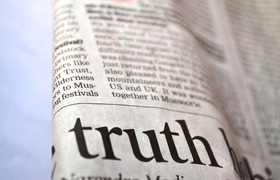The importance of independent media
26 September 2019 | Story Carla Bernardo. Photo BrotiN biswaS/Pexels. Read time 7 min.
The world’s media are facing unprecedented challenges, from declining revenue, a broken business model and new forms of censorship, to threats to journalists’ safety, misinformation campaigns, competition with social media and growing public distrust.
South Africa’s media are no exception, in spite of the privileges afforded to local journalists by, for example, Section 16 of the country’s Constitution.
It was against this background that the Institute for African Alternatives (IFAA) recently hosted a public forum, “The future of independent media”, at Community House in Salt River.
University of Cape Town (UCT) alumnus, anti-apartheid activist and IFAA director Professor Ben Turok chaired the forum. His guests were veteran journalist Karima Brown, amaBhungane investigative journalist Micah Reddy, and Associate Professor Wallace Chuma from UCTʼs Centre for Film & Media Studies.
Chuma was previously a journalist with Zimbabwe’s independent Daily News, edited the Zimbabwe Mirror and spent time on reporting fellowships in Botswana and the United States. Alongside his teaching of journalism and media studies, his research areas include contemporary journalism and the public sphere, critical political economy of media, and media policy and regulation.
UCT News caught up with Chuma after the discussion for his views on the most pertinent points:
What is the danger of not having an independent media?
“If you’ve got media that’s not independent, the danger is one-dimensionality. So you’ve got a media that speaks only to a specific constituency on whom the media is dependent. If you are going to have a media that speaks in the same voice … the voice of those who own and control it, that undermines media diversity and plurality and once that is undermined, it also undermines democracy itself. An independent media is important for various reasons but not least the fact that it can represent a whole range of opinions and viewpoints in a given society.”
“If you are going to have a media that speaks in the same voice … the voice of those who own and control it, that undermines media diversity and plurality and once that is undermined, it also undermines democracy itself.”
How do citizens protect media?
“I think citizens need to hold media to account through feedback but also calling out of journalists. The other thing is that [it is] about time citizens – those who can afford to – support small media initiatives. For example, GroundUp and the initiative the Daily Maverick is taking. Those that can afford to contribute to support and sustain independent journalism, they should do that. The more people who can do that, the better. We realise that the big media companies are in it for the money so if you can have a whole range of citizens coming together in supporting critical, quality journalism, that is good for media and democracy as well.”
What does an independent media look like?
“No one sort of definition explains everything. But, in my view, an independent media is one that is beholden to citizens as opposed to one that is beholden to power. It is sufficiently well funded that in its day-to-day operations it does not have to look back to see that [it is] not offending one or the other set of powers. In other words, it is made up of journalists and citizens who are driven by the desire to report the story or tell the story without … being driven by a whole range of [powerful] forces. In other words, independence to me speaks to the kind of autonomy from direct and indirect pressure brought to bear on them by corporate hierarchies, by politicians and by any other sectional groups.”
How do journalists build and rebuild trust?
“I think journalists should, as much as possible, even in the context of declining resources, try to go out there, get out of their comfy places, reach out to poor communities, especially marginalised communities who are the majority. Go out there and do stories that concern ordinary people. It is a fallacy that those stories do not sell. They sell if there is a consistent build-up of narrative…
“I think journalists should recultivate that trust by going out to communities.”
“Communities which continue to be marginalised turn violent and that violence will lead one day, sooner or later, to Sandton. In other words, it is in the interest of government but also big businesses to attend to that. So if those stories are consistently told by journalists who go out of their comfort zones to tell stories in communities, that becomes good not just for citizenship but also for businesses because you are talking about social stability.
“So I think journalists should recultivate that trust by going out to communities. For example, there was a recent story where the only group that marched and brought forward the issue of xenophobia was a group called Abahlali baseMjondolo in Durban. This is a community group which doesn’t get a lot of media coverage. But they have gone out of their way to say … no to xenophobia. Can you imagine if the media had built alliances with those sorts of groups?
“In other words, the starting point should be to move out of their comfort zones and speak to the marginalised communities because that’s democracy. The elites are pampered already … and have access to almost everything, but I think it should be in the interest of every journalist to want to champion a more equitable, democratic community. To me, that should be the starting point and everything else will fall into place.”
 This work is licensed under a Creative Commons Attribution-NoDerivatives 4.0 International License.
This work is licensed under a Creative Commons Attribution-NoDerivatives 4.0 International License.
Please view the republishing articles page for more information.










